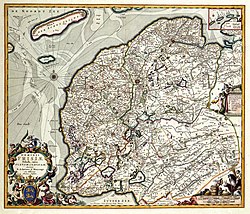Lordship of Frisia
| Lordship of Frisia | ||||||||||
|
Heerlijkheid Friesland (nl) Hearlikheid Fryslân (Frisian) |
||||||||||
|
State of the Holy Roman Empire (until 1648) part of the Habsburg Netherlands (1524–1581) part of the Dutch Republic (from 1581) |
||||||||||
|
||||||||||
|
Lordship of Frisia 1680, divided into quarters Westergo, Oostergo, Zevenwouden, Steden
|
||||||||||
| Capital | Leeuwarden | |||||||||
| Languages | Old Frisian, West Frisian, Dutch Low Saxon | |||||||||
| Religion | Catholic Church Protestantism | |||||||||
| Government | Feudal monarchy | |||||||||
| Historical era | Middle Ages | |||||||||
| • | Established | 1524 | ||||||||
| • | joins the Dutch Revolt | 1579 | ||||||||
| • | last count, Philip II deposed | 1581 | ||||||||
| • | Disestablished | 1795 | ||||||||
|
||||||||||
The Lordship of Frisia or Lordship of Friesland (Dutch: Heerlijkheid Friesland) was a feudal dominion in the Netherlands. It was formed in 1524 when Emperor Charles V finally conquered Frisia.
The former Frisian kingdom (Magna Frisia) had been incorporated into Francia after the Frisian–Frankish wars, that ended with the victory of the Frankish troops led by majordomo Charles Martel at the Battle of the Boarn in 734. The remaining territory east of the Lauwers River was conquered by Charlemagne in the course of the Saxon Wars until 785.
During the decline of the Carolingian Empire in the 9th century, the Frisian coast with the important trading place of Dorestad was strongly affected by Viking raids. In turn the Frankish emperor Louis the Pious and his successor Lothair I, ruler of Middle Francia since 843, tried to pacify the Viking leaders such as Harald Klak or Rorik of Dorestad by vesting them with lage estates in the Frisian lands. By the 870 Treaty of Meerssen, the Frisian lands passed to the Kingdom of East Francia under Louis the German, while the robberies continued. In 873 the Viking leader Rodulf Haraldsson was killed by the inhabitants of Eastergoa and from 879 Harald Klak's son Godfrid plundered the coast down to Flanders until he finally came to terms with Emperor Charles the Fat upon the 882 Siege of Asselt and was appointed a "Duke of Frisia".
...
Wikipedia


